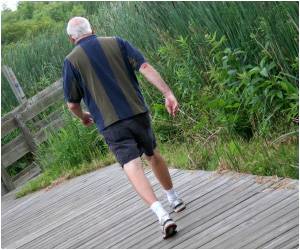Staving off major disability and enhancing the quality of later years in older adults is just a matter of taking a daily 20-minute walk, reveals a study.

The LIFE study is the largest randomized controlled trial ever conducted on physical activity and health education in older adults. Coordinated at the University of Florida, Gainesville, the study enrolled 1,635 sedentary men and women aged 70 to 89 who led sedentary lifestyles and were at risk of mobility disability. Participants were recruited from urban suburban, and rural communities around the country, and randomly assigned to either a structured, moderate-intensity physical activity program, or to a health education program focused on topics related to successful aging. The trial examined whether physical activity prevents or delays mobility disability.
After more than two years of follow-up, the multicenter team found that the risk of major mobility disability was reduced by 18% among participants in the physical activity group, meaning that they were more capable of walking without assistance for about a quarter mile. "We want to change how people live," said the director of the Yale field center, Thomas Gill, M.D., the Humana Foundation Professor of Geriatric Medicine, who chaired the measurement committee, which was responsible for determining the main study outcomes. "Maintaining independence for older adults is both a public health and a clinical priority, and modifying lifestyle is an important approach to maintaining independence." Gill added, "Years from now, LIFE will be considered a landmark study, one that has informed policies to keep older persons independent in the community."
Source-Eurekalert
 MEDINDIA
MEDINDIA




 Email
Email






